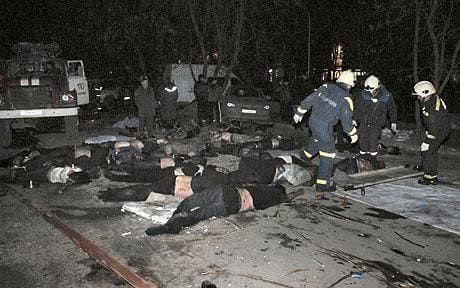
Terror group that hit Moscow nightclub has sights set on US
ISIS-K, the terrorist organization that killed more than 140 Russians March 22 in Moscow, would like to replicate the attack in the United States, but it lacks the capability, current and former senior U.S. officials say.
“The U.S. remains target No. 1 for ISIS-K,” said Mark Quantock, a retired two-star Army general who oversaw intelligence operations for U.S. Central Command. “They clearly would like to strike the homeland, but their challenge is penetrating our security, which has proven to be quite resilient in recent years.”
Known for its brutality, ISIS-K considers Russia and many Western countries anti-Muslim. Russia has sided with Syrian President Bashar Assad in its civil war, launching airstrikes for years that that have killed Islamic militants and displaced hundreds of thousands of Syrians. The group also regards even hard-line Muslim regimes like the Taliban to be insufficiently devout. It once targeted a maternity clinic in Afghanistan and was responsible for the attack in August 2021 in Kabul that killed 13 U.S. troops and 170 Afghans during the chaotic retreat of Americans and Afghans.
The K in ISIS-K stands for Khorasan, a region in and around Afghanistan. ISIS-K is an even more violent offshoot of the Islamic State group, or ISIS, which gained strength in 2014 and seized swaths of territory in Iraq and Syria. Sustained military operations by U.S.-backed forces have since sapped its strength, yet it still strives to strike inside America.
Looking beyond Afghanistan for places to attack, but with limited reach
The attack in Russia on a concert hall, and ISIS-K suicide bombers in Iran in January who killed about 100 worshipers, shows the group retains the ability to export attacks, said one official, who was not authorized to speak publicly. But the attacks also show the limits of ISIS-K’s reach with no recent assaults in Western Europe. One of the Islamic State group’s last major attacks in Western Europe took place almost eight years ago, killing 17 people. That type of attack appears beyond ISIS-K’s current capability, the official said. The group does, however, seek to inspire disaffected people in the west to mount their own terror attacks, the official said.
In congressional testimony, senior military officials have said pressure on ISIS-K by the ruling Taliban in Afghanistan have “temporarily” disrupted the group’s ability to strike in the United States and other Western nations.
Army Gen. Erik Kurilla, commander of U.S. Central Command, said the Taliban had targeted key ISIS-K leaders in 2023 but have not shown the ability to sustain pressure on the group, which allowed it to regenerate. He said ISIS-K could attack U.S. and Western interests abroad in as little as six months “with little to no warning.”
Before the ISIS-K attacks in Iran and Russia, U.S. officials had sent warnings to those governments. White House national security council spokesman John Kirby told reporters Thursday that officials had warned the Kremlin in writing March 7 of a planned attack on a public gathering like a concert.
When the U.S. intelligence community receives specific, credible information about a threat abroad, the information gets passed on to U.S. citizens through local embassies, the senior U.S. official said. The information also is passed on to the foreign government, in this case Russia, so it can take action to disrupt an attack.
‘Duty to warn’
“Duty to warn” is an internal U.S. government policy, one official explained. Its chief aim is to protect Americans abroad and to prompt foreign governments to prevent attacks. Russia, typically, does not reciprocate by providing similar information to the U.S. government, the official said.
Since 9/11, the federal government has taken several steps, including no-fly lists to prevent terrorists from entering the country, the official said.
Coordination among agencies such as Customs and Border Patrol and the FBI, along with the Pentagon and the intelligence community, is at an all-time high, said Quantock, the former intelligence official.
That shouldn’t prompt anybody to get complacent, he said.
“ISIS has proven to be a pretty patient foe,” Quantock said. “And the U.S. attention span is notably short.”
Source » msn





